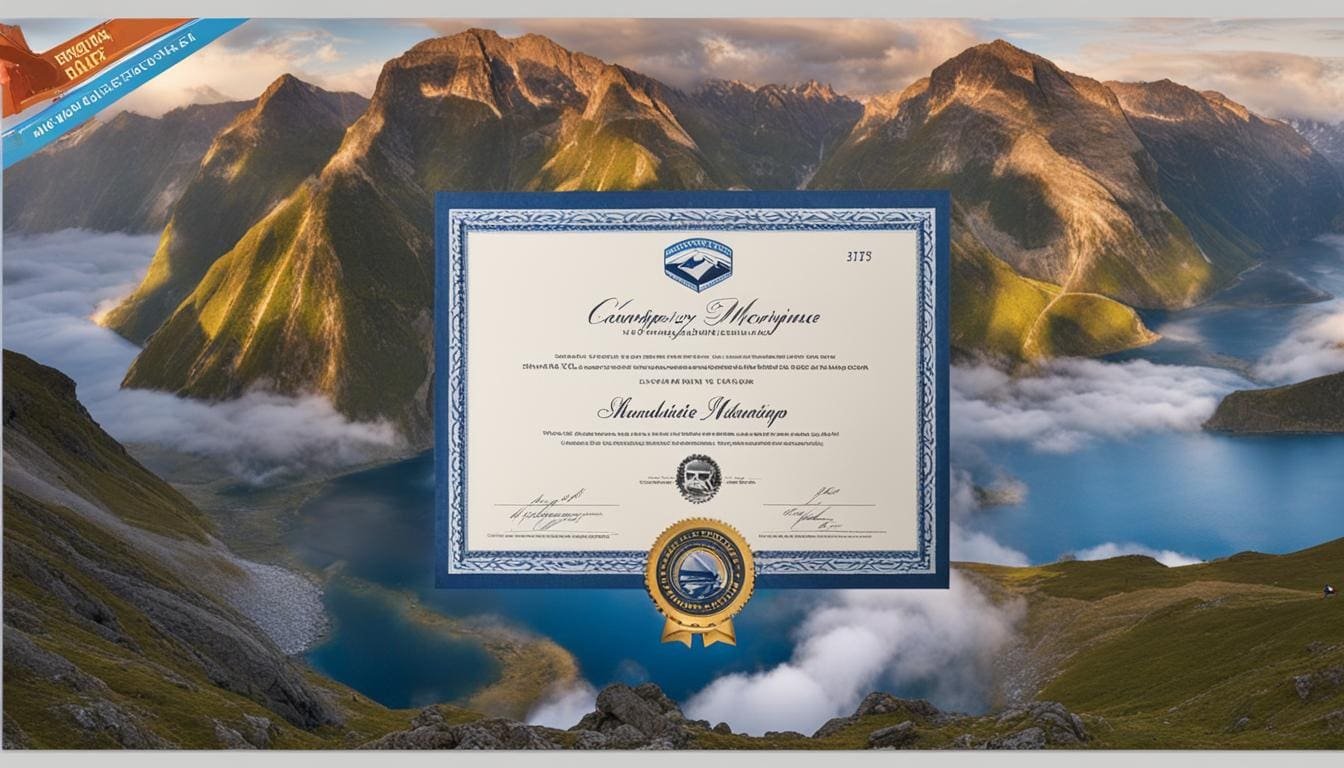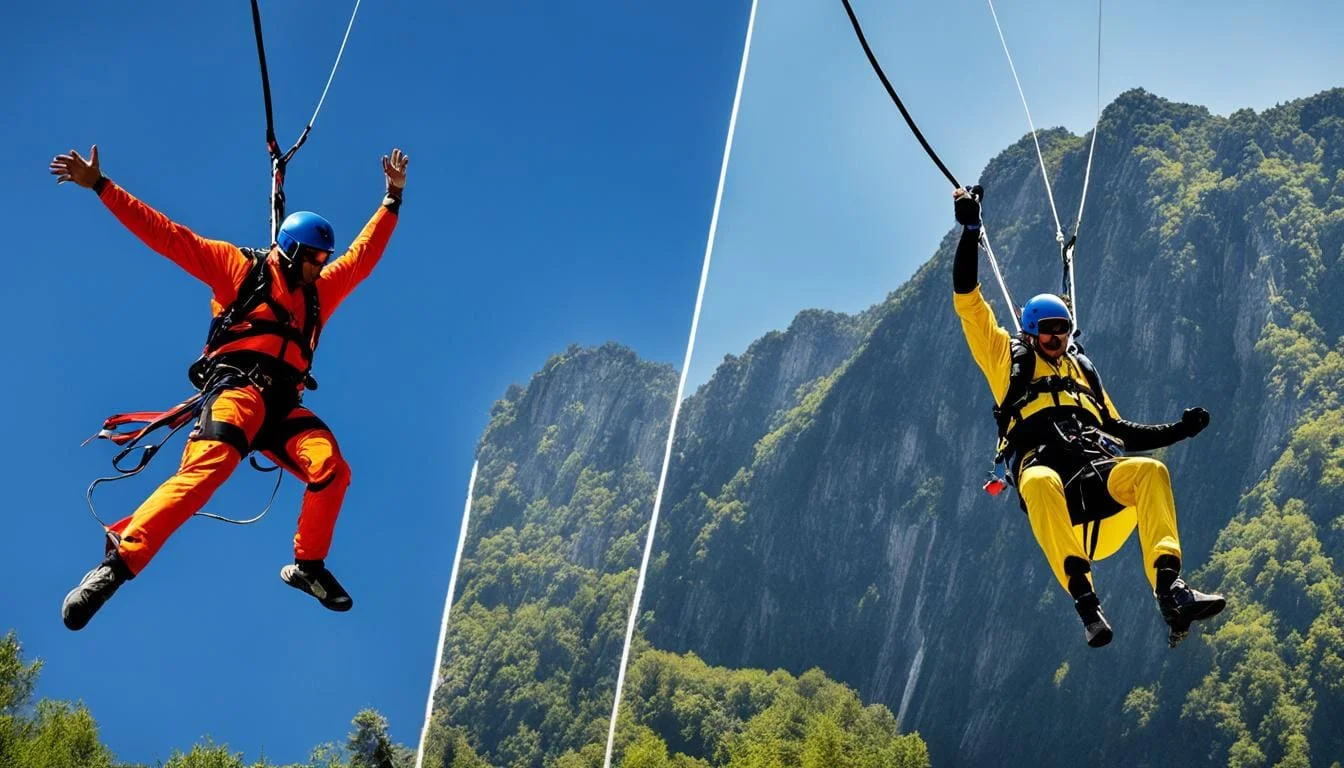Welcome to our article on base jumping license requirements and the legal regulations surrounding this thrilling sport. Base jumping involves the exhilarating act of leaping from a fixed object and parachuting down to the ground. However, when it comes to the legality of base jumping, things can get a bit complicated. In this article, we’ll delve into whether a license is required for base jumping and explore the regulations and permits that govern the sport.
Key Takeaways:
Overview of BASE Jumping Legality in the United States
When it comes to the legality of base jumping in the United States, there are specific regulations and designated locations that aspiring base jumpers must be aware of. Understanding these regulations is crucial to ensure a safe and legal experience in this thrilling extreme sport.
National Parks vs. Federal Land Regulation Differences
In the United States, base jumping is strictly prohibited in all national parks. These protected areas prioritize the preservation of natural resources and the safety of visitors. However, there are certain areas of federal land managed by the Bureau of Land Management and U.S. Forest Service where base jumping is permitted, subject to specific regulations.
Designated Legal BASE Jumping Locations in the US
For those seeking legal base jumping opportunities, there are designated locations across the United States. One popular location is the Perrine Bridge in Twin Falls, Idaho, renowned for its stunning scenery and base jumping community. The New River Gorge Bridge in Fayetteville, West Virginia, is another notable site where base jumping is allowed. These locations offer the necessary infrastructure and safety measures to facilitate exhilarating jumps within the boundaries of the law.
Consequences of Jumping without Authorization
Engaging in base jumping without proper authorization can have serious consequences. Jumpers who disregard the regulations put in place may face citations, fines, arrests, and potentially even criminal charges. These legal consequences emphasize the importance of respecting the rules and seeking permission before undertaking any base jumping activities.
| Illegal Base Jumping Consequences | Legal Implications |
|---|---|
| Citations | Base jumping without proper authorization can result in citations from law enforcement officials. |
| Fines | Jumping without permission may lead to hefty fines imposed by the relevant authorities. |
| Arrests | Illegal base jumping can result in arrests, potentially leading to a criminal record. |

It is important for base jumpers to understand the legal consequences associated with illegal jumps and to always adhere to the regulations in place to ensure their safety and the safety of others.
Legal Regulations in BASE Jumping Worldwide
Base jumping regulations vary widely around the world. Some countries have specific regulations in place for base jumping, while others may treat it as a subset of existing skydiving or parachuting regulations. It is important to understand the legalities and restrictions in each country before engaging in base jumping. Additionally, comparisons with other extreme sports’ regulations can provide insights into the unique challenges and considerations of base jumping.
Countries with Specific Regulations
Many countries have implemented specific regulations to govern base jumping activities. These regulations outline the requirements, permissions, and restrictions that base jumpers must adhere to. By implementing specific regulations, countries aim to ensure the safety of both participants and the general public. Some countries with specific regulations for base jumping include:
- United States
- Norway
- Australia
- New Zealand
- Switzerland
Each country’s regulations may differ in terms of licensing, certification, and location restrictions. Base jumpers should familiarize themselves with the specific requirements of their chosen country to ensure compliance with the law.
Comparison with Other Extreme Sports
When considering base jumping regulations, it is essential to compare them with regulations governing other extreme sports. This comparison provides valuable insights into how base jumping is perceived and regulated in relation to activities such as skydiving, bungee jumping, and paragliding. While base jumping shares similarities with these sports, its unique characteristics often result in distinct regulations.
| Extreme Sport | Specific Regulations | Location Restrictions |
|---|---|---|
| Base Jumping | Varies by country | Specific sites or unauthorized jumps |
| Skydiving | Training and licensing requirements | Authorized drop zones |
| Bungee Jumping | Inspections and certifications for equipment | Authorized jump sites |
| Paragliding | Training and licensing requirements | Designated paragliding areas |
Do You Need a License for BASE Jumping
Currently, there is no federal law in the United States that explicitly requires a license for base jumping. However, certain states or local jurisdictions may have their own licensing requirements. Additionally, obtaining base jumping certification and completing training courses can demonstrate the necessary skills and knowledge for engaging in the sport safely.
If you’re considering taking up base jumping, it’s important to understand the regulations and requirements in your area. While a license may not be mandatory, obtaining certification and undergoing proper training can enhance your safety and competence as a base jumper.
The process of obtaining a base jumping license can vary depending on your location. Some jurisdictions may require you to pass written and practical exams, provide proof of completed training courses, or fulfill specific criteria set by the local authorities or organizations overseeing base jumping activities.
By obtaining a base jumping certification, you can acquire the necessary skills and knowledge to navigate the challenges and potential risks involved in this extreme sport. Certification programs often cover topics such as equipment use and maintenance, emergency procedures, weather conditions, and essential safety protocols.
Completing a base jumping training course not only bolsters your skills but also demonstrates your commitment to safety and responsible participation in the sport. This can help foster positive relationships with local authorities and landowners, as well as contribute to the overall reputation and legitimacy of base jumping as an activity.

While it may not be a legal requirement, obtaining a base jumping license or certification can provide valuable benefits. It allows you to join organized base jumping events and competitions, gain access to certain jumping sites and private property, and potentially secure insurance coverage specifically tailored for base jumping activities.
It’s important to stay informed about the rules and regulations governing base jumping in your area. Always prioritize safety and responsible behavior to ensure the longevity and enjoyment of this exhilarating sport.
The Risks and Restrictions Behind BASE Jumping’s Legal Status
Base jumping is an extreme sport that comes with inherent risks, leading to the implementation of strict regulations and restrictions to ensure public safety. These safety concerns revolve around a variety of factors, including equipment failure, inadequate training, and lack of experience.
Equipment failure is a significant risk in base jumping. Malfunctioning parachutes or other gear can lead to life-threatening situations and potentially fatal accidents. Proper maintenance and inspection of equipment are crucial to minimize these risks.
Another crucial aspect is training. Base jumping requires specialized skills and knowledge to perform safely. Lack of proper training can result in miscalculations, leading to severe injuries or even death. As a result, regulations often require jumpers to undergo comprehensive training and obtain certification to ensure their competence in this high-risk activity.
Furthermore, the lack of experience can also pose significant dangers. Base jumping demands a thorough understanding of aerodynamics, weather conditions, and emergency procedures. Inexperienced jumpers may underestimate these factors, increasing the likelihood of accidents.
Illegal base jumping further exacerbates the risks and poses additional challenges for public safety. Jumping from unauthorized locations or without the necessary permits can strain emergency response teams and public services. The potential need for rescue operations in remote or difficult-to-reach areas puts both jumpers and emergency personnel at risk.
The legal status of base jumping is a subject of ongoing debate. While enthusiasts argue that it should be recognized as an adventurous and thrilling sport, others consider it a public menace due to the associated risks and potential disruption to public services. This debate underscores the complexity of balancing individual freedom and public safety in extreme sports like base jumping.
| Risks of Base Jumping | Safety Concerns |
|---|---|
| Equipment failure | Lack of proper training |
| Inadequate maintenance | Lack of experience |
| Unpredictable weather conditions | Emergency procedures |
Navigating BASE Jumping Permits and Regulations
In order to engage in the thrilling activity of base jumping, it is essential to navigate the permits and regulations that govern this extreme sport. Understanding the certification requirements, knowing where and how to obtain necessary permits, and recognizing the role of training and experience in legal compliance are all crucial aspects of ensuring a safe and enjoyable base jumping experience.
Understanding BASE Jumping Certification Requirements
While there is no federal law in the United States that explicitly requires a license for base jumping, it is highly advisable to obtain proper certification. Base jumping certification demonstrates the necessary skills and knowledge required to engage in the sport safely. Completing training courses and obtaining certification from reputable organizations can provide valuable insights into the techniques, equipment, and safety protocols essential for base jumping.
Where and How to Obtain Necessary Permits
In order to jump legally, it is important to obtain the necessary permits based on the regulations in your region. The specific procedures for obtaining permits may vary depending on the location. Some base jumping sites require permits from local authorities, while others may have specific requirements established by national park services or land management agencies. It is essential to research and understand the permit application process for each desired base jumping location.
The Role of Training and Experience in Legal Compliance
Training and experience play a vital role in complying with base jumping regulations. The more experience and knowledge a base jumper possesses, the better equipped they are to navigate the challenges and potential risks associated with this high-adrenaline sport. Continued training and practicing safe techniques is crucial for maintaining legal compliance and ensuring the safety of oneself and others.
| Certification Requirements | Permit Application Process | Training and Experience |
|---|---|---|
| Obtain certification from reputable organizations to demonstrate skills and knowledge. | Research and understand the permit application process for each desired base jumping location. | Continued training and experience are important for legal compliance and safety. |
| Complete training courses to gain insights into equipment, techniques, and safety protocols. | Follow the specific procedures established by local authorities or land management agencies. | Experienced base jumpers are better equipped to navigate risks and challenges. |
| Ensure compliance with regulations by obtaining the necessary permits. | Submit permit applications in a timely manner to secure authorization for base jumping. | Practicing safe techniques is essential for legal compliance and the safety of oneself and others. |
Conclusion
In conclusion, base jumping is an exhilarating extreme sport that attracts enthusiasts from around the world. However, the legality of base jumping varies depending on the jurisdiction. While some countries may not require a license, there are often regulations and permits that must be followed to ensure the safety of both jumpers and the public.
Future Trends in BASE Jumping Regulation
As base jumping continues to gain popularity, it is likely that future trends in regulation will focus on enhancing safety measures. Governments and regulatory bodies may implement stricter certification requirements and further designate legal base jumping locations to mitigate risks. Base jumpers should stay up-to-date with the evolving regulations and adapt their practices to ensure compliance.
Advice for Aspiring BASE Jumpers Seeking Compliance
For aspiring base jumpers, it is crucial to prioritize safety and comply with all relevant regulations. Obtaining proper certification and completing training courses can provide the necessary skills and knowledge to engage in base jumping safely. Additionally, aspiring base jumpers should familiarize themselves with the specific regulations in their region and seek appropriate permits before attempting any jumps.
The Continued Appeal of BASE Jumping Despite Legal Hurdles
Despite the legal hurdles, the unique adrenaline rush and thrill of base jumping continue to captivate enthusiasts worldwide. The freedom of leaping from towering structures and experiencing the beauty of freefall attracts those seeking an extraordinary adventure. While adhering to regulations and permits is essential, base jumping will undoubtedly remain a deeply appealing activity for those who crave the ultimate adrenaline rush.




Leave a Reply